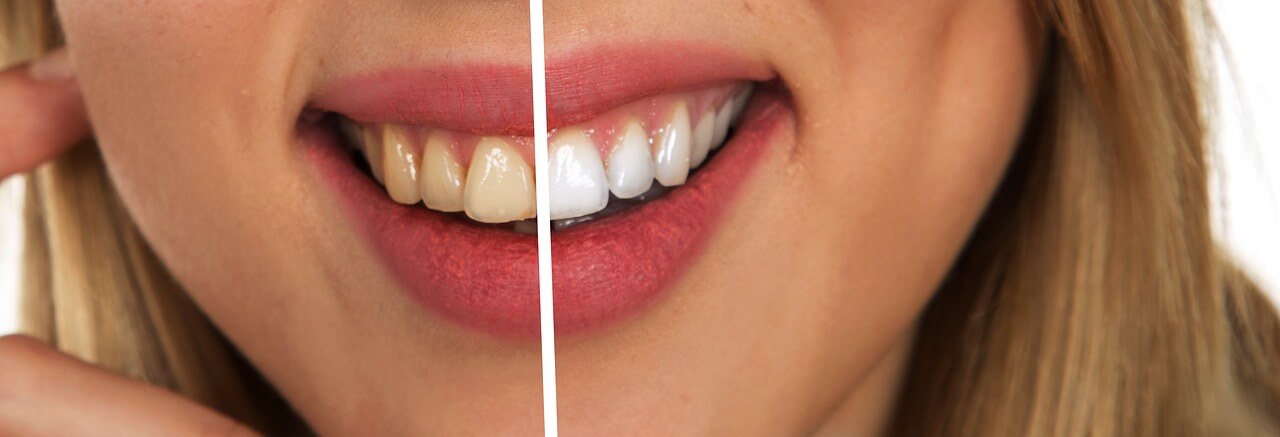As we all know, you can keep your teeth white by brushing them twice every day. But, if you feel like your smile could do with some brightening, then you may be considering teeth whitening options. Find out more about what teeth whitening is, how it works and whether it is right for you.
Why Are My Teeth Discoloured?
Naturally, teeth are not bright and so it is normal to not have gleaming white teeth. However, there are some things which will, over time, naturally discolour your teeth and may leave you feeling somewhat self conscious. For instance:
- Food and Drink: Coffee, tea and red wine are some of the main major reasons for staining thanks to their natural high colour pigments.
- Use of Tobacco: Tar and nicotine are next on the culprits for teeth staining, being that they both turn to a yellowish substance once they are being used.
- Age: Below the enamel on your teeth is a softer area called dentin, which gets thinner with brushing.
- Trauma: If you’ve been hit in the mouth, your tooth may change colour because it reacts to an injury by laying down more dentin, which is a darker layer under the enamel.
- Medications: Tooth darkening can be a side effect of certain antihistamines, antipsychotics and high blood pressure medications. Young children who are exposed to antibiotics like tetracycline and doxycycline when their teeth are forming (either in the womb or as a baby) may have discolouration of their adult teeth later in life.
While you shouldn't avoid some of the habits above, such as drinking tea or coffee, as this is a big part of many people's lives. Yet, brushing your teeth more regularly can help and lessening your intake to prevent discolouring your teeth further.
How Does Teeth Whitening Work?
Luckily, teeth whitening can help restore the colour of your teeth and leave you feeling confident in your smile again. Whitening products contain one of two tooth bleaches (hydrogen peroxide or carbamide peroxide). These bleaches break stains into smaller pieces, which makes the colour less concentrated and your teeth brighter.
If you have your teeth whitened, you'll have to make several visits to the dental surgery over a couple of months.
The dentist will take an impression (mould) of your teeth to make a mouthguard and tell you how to use it with a bleaching gel. Then, using your mouthguard at home, you will have to regularly apply the gel for a period of time - usually 2 to 4 weeks. Some whitening gels can be left on for up to 8 hours at a time, which shortens the treatment period to 1 week.
Laser whitening, also known as power whitening, is another type of teeth whitening system. A bleaching product is painted onto your teeth and then a light or laser is shone on them to activate the whitening. Laser whitening typically takes about an hour to do per session.
What Are the Potential Risks to Teeth Whitening?
There's always a chance your gums will be sensitive to the chemicals used in teeth whitening, particularly if you already have sensitive teeth. However, opting for a dentist to do your teeth whitening is always recommended as they'll be able to examine your mouth and teeth properly and to decide whether or not you should continue with the procedure.
Using at-home teeth whitening kits can harm tooth enamel, and may risk chances of burns to the gums. If you do try and whiten your teeth yourself, you may risk:
- Gum irritation: Some patients with already-existing tooth damage may risk causing gum irritation.
- Hypersensitivity: Those already with sensitive teeth may find eating or drinking certain foods following the treatment more difficult. This is usually caused by the chemicals in teeth whitening kits.
- Uneven Results: Your teeth may have already been stained, and you wouldn't be able to tell without a dentist, and may lead to uneven bleached results.
- Over-Bleaching: Only those trained to do teeth whitening should do it, as at-home kits can lead to patients over-bleaching own their teeth.
How Much Does Teeth Whitening Cost and Is It Worth Doing?
Charges will vary from practice to practice and region to region, however, laser or power whitening will be more expensive than professional bleaching. It’s recommended you get a written estimate of the cost before you start any treatment.
The effects of whitening are said to last up to three years, however, this will vary from person to person. The effect is less likely to last as long if you smoke or eat or drink products that can stain your teeth. So, this is something to keep in mind if you believe it will be difficult to change or adapt your lifestyle.
Summary: Is Teeth Whitening Worth It?
Overuse of whiteners can damage the tooth enamel or gums, so be sure to follow directions and talk to your dentist.
Tooth-whitening works best for people with yellow teeth and is less effective for people with brown teeth. If your teeth are grey or purple, tooth bleaching probably isn’t the best choice.
To be sure tooth-whitening is worth your time and money, talk to your dentist before you use an over-the-counter tooth whitening kit. It is, nevertheless, always better to consult professional treatment to see long-lasting and proper results. d


 71–75 Shelton Street, Covent Garden, London, WC2H 9JQ
71–75 Shelton Street, Covent Garden, London, WC2H 9JQ +44 (0) 20 3376 1032
+44 (0) 20 3376 1032



